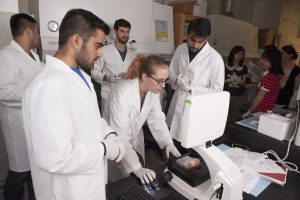Admission Requirements
- You must meet the general admission requirements that pertain to all master’s degree candidates.
- You are expected to hold a degree in engineering.
- If you majored in a related science or engineering field, you may also be accepted, provided your background is judged by the admissions committee to be equivalent to that stated above.
- Your prior education must include the following prerequisites:
- mathematics, through ordinary differential equations;
- calculus-based physics;
- chemistry; and
- one semester/term of a programming language (e.g., Python, Java, MatLab).
- If your prior education does not include the prerequisites listed above, you may still be admitted under provisional status, followed by full admission once you have completed the missing prerequisites. Missing prerequisites may be completed with Johns Hopkins Engineering or at another regionally accredited institution. Students who wish to refresh their knowledge may also take the prerequisite courses.
- When reviewing an application, your academic and professional background will be considered.
- If you are an international student, you may have additional admission requirements.
Degree Requirements
- Ten courses must be completed within five years.
- The curriculum consists of five core courses; two biology/physiology courses, one math-based course, and two from the chosen focus area. Students choose five electives. At least four of the ten courses must be at the 700-level or higher.
- Electives may be substituted for the required core courses if the student has previously completed equivalent graduate-level courses or can demonstrate competency. Electives may be from the Applied Biomedical Engineering (585.xxx) program, or from the Department of Biomedical Engineering (580.xxx) in the full-time program, or preapproved courses listed under the electives.
- You may take courses from other programs following approval by the Applied Biomedical Engineering chair or vice chair.
- All course selections outside the Applied Biomedical Engineering program are subject to advisor approval.
- As an Applied Biomedical Engineering student, you must choose a focus area and satisfy course requirements associated with that focus area for degree completion. You may define a focus area selection for degree completion at any time during enrollment in the program, but selection early in your enrollment is recommended to guide your course selections.
Course Planning and Search
Wondering what course to take when or which courses are required? Use these helpful course planning and course search tools to help map out your path to degree completion.
Academic Calendar
Find out when registration opens, classes start, transcript deadlines and more. Applications are accepted year-round, so you can apply any time.
Certificate in Applied Biomedical Engineering
If you are not quite ready to commit to a master's degree, consider pursuing a graduate certificate as an option. You can earn a certificate in 4 courses and put the credits towards your future master's degree. Or if you already have a master's degree in applied biomedical engineering or a closely related field, a post-master's certificate can broaden your expertise.
Looking to Study On Campus?
Johns Hopkins Engineering's Biomedical Engineering program is ranked #1 by U.S. News & World Report and is ideal for students who wish to pursue careers in research and development, academics, or medicine.


